Justin Kahn: How to work with specialized media

Stanford course CS183B: How to start a startup . Started in 2012 under the leadership of Peter Thiel. In the fall of 2014, a new series of lectures by leading entrepreneurs and Y Combinator experts took place:
Second part of the course
First part of the course
- Sam Altman and Dustin Moskovitz: How and why to create a startup?
- Sam Altman: How to form a start-up team and culture?
- Paul Graham: Illogical startup ;
- Adora Cheung: Product and Honesty Curve ;
- Adora Cheung: The rapid growth of a startup ;
- Peter Thiel: Competition - the lot of losers ;
- Peter Thiel: How to build a monopoly?
- Alex Schulz: An introduction to growth hacking [ 1 , 2 , 3 ];
- Kevin Hale: Subtleties in working with user experience [ 1 , 2 ];
- Stanley Tang and Walker Williams: Start small ;
- Justin Kahn: How to work with specialized media?
- Andressen, Conway and Conrad: What an investor needs ;
- Andressen, Conway and Conrad: Seed investment ;
- Andressen, Conway and Conrad: How to work with an investor ;
- Brian Cesky and Alfred Lin: What is the secret of company culture?
- Ben Silberman and the Collison Brothers: Nontrivial aspects of teamwork [ 1 , 2 ];
- Aaron Levy: Developing B2B Products ;
- Reed Hoffman: On Leadership and Managers ;
- Reed Hoffman: On the leaders and their qualities ;
- Keith Rabois: Project Management ;
- Keith Rabua: Startup Development ;
- Ben Horowitz: Dismissal, promotion and reassignment ;
- Ben Horowitz: Career advice, westing and options ;
- Emmett Shire: How to conduct interviews with users;
- Emmett Shire: How to talk to users in Twitch ;
- Hossein Rahman: How hardware products are designed in Jawbone;
- Hossein Rahman: The Design Process at Jawbone.
Sam Altman: Now I want to invite Justin Kan . Justin was the founder of KiKo and Justin.tv, which is now known as Twitch. He is going to talk about working with specialized media.
')
Justin: I started a lot of startups, but I think you have already heard enough stories in the spirit of "how I started," so I'm going to talk to you on a more interesting topic, around which there are constantly a lot of questions - how to get into the media, and how can help you. My story is a shortened version of what you are told about in Y Combinator. Hope you guys find it interesting.
Most people, when they start doing business, believe that you can get into the media only by magic. They think that journalists are always trying to get and record the best interviews in order to rise in the eyes of their bosses and colleagues, but this is absolutely not the case.
Before you think about articles and interviews in magazines and newspapers, you must decide who you want to reach and what your goal is . At first, I also wanted to get into publications that specialize in news. I thought it was very important for the company, but later I realized that if I didn’t set myself any goal, then I’ll not be able to achieve it. This phrase applies to almost all cases of life, including journalism. If you just want to light up in the press, then this will not have any impact on the development of a startup. If you have not set yourself a clear business goal, then this is just a waste of time.

You can set several goals and objectives. In the case of Socialcam, which is an offshoot from Justin.tv, our goal was to make sure that when people heard the name Socialcam, they would immediately imagine Instagram, but from a video. Thus, when the time comes to seek funding from the bosses and investors of Silicon Valley, we would already be known in the technological media as a new social application.
In the case of Exec, my goal was to attract customers. Exec is a bit of a small cleaning service, and our main goal was to encourage San Francisco people to use our services. To use the national media for this purpose is useless, because 99% of the country's population will not be able to use our services. Therefore, we set our sights on the local newspaper SF Cronicle, which was read by our potential customers.
TwitchTV is probably the most famous of my projects named - this is something like the ESPN channel for gamers, in other words, the stream community. In this case, the goal was to attract the attention of the gaming public. Today about 55 million people know about the service, but at the start nobody knew about it. It was not an entertainment site, it was a small, unknown gaming community. Our goal was to attract developers and advertisers to the gaming industry and show them that Twitch can be profitable. In this regard, our goal has become video game developers and gaming trading platforms, what potential users are reading and watching.

So what do the profile media usually write about? I think that there are several different topics, and all these situations usually happen with startups. The first is the launch of a product on the market, they can write about it if you release a new version of your application.
The next popular topic is investment or fundraising. For some reason, for some reason, the press likes to write about earnings, although this is completely uninteresting. Rest assured, if you have reached the income level of a million dollars, then they will definitely write about you.
Also in the press they like to write about how quickly a company earns its money. For example: a million dollars a week. The company that bought Exec recently announced that they were earning over a million dollars in a week, and they wrote a fair amount of magazines and newspapers.
Success stories are another popular topic. When you become a successful company, The New York Times, The New Yorker or Business themselves will want to publish the history of your startup. This does not need to worry at first.
Also love to write about antics, as I call them. I don’t know if you remember it or not, a few years ago, a company from YC called WePay threw an ice cube with frozen money out of the window of the building where the conference was held. The event was due to the fact that PayPal rattled on all the news because of the intentions to freeze the accounts of some developers. This case was covered in the press in an incredibly wide way, and an interesting point: PayPal was not mentioned at all in this report.
The media is a good help when submitting job ads. If you are a big enough company and search for employees, then people will want to know about it.
And finally, you can get into articles written in the style of a review of a particular industry or the opinions of a correspondent, for example, it could be a technology blog or something like that.

In theory, everything that I have outlined above can be a good storyline for reporting. But usually, starting a startup, people do not think that their activities may be of interest to them, but completely uninteresting to others . You need to think and make an objective decision about whether you would read an article about the product you are promoting if you were not the founder of the company?
You need to understand that articles about the introduction of new functions in version 2.01 of your application or the material about the new option “Find friends” via Facebook may not be interesting to anyone. You need to wait for time and look at the situation from the side, before you spend time writing articles and ask yourself the question: “ Will it really read someone? ". Journalists and bloggers are primarily looking for stories that will be interesting to learn from their audiences.
On the other hand, when giving interviews, you do not have to be extremely honest. You should not be mentioned as the second best company to collect $ 5 million dollars on Kickstarter - the one who won first place will collect all the laurels. The first game console, which collected $ 10 million dollars on Kickstarter - it was just a huge news, because they were the first in their category, although before them other companies collected huge sums. Think about the context of your stories, see if someone has written something similar or what you want to describe - a fairly new topic.
There is a way to get into a report or article (quite consistent). If you want to publish news in the press, you need to think of it as a springboard for sales. You will talk a lot with people, but not all of them will agree to write about you. No need to be upset if one journalist refused to interview you.
The first step is to think about your story . The second step is a personal acquaintance with one or more reporters to interview you. The easiest and most reliable way to meet journalists is to ask someone about it, just like in a business relationship - it's better than writing emails to unknown people. It is best to ask entrepreneurs who have been written in other articles, or their friends who have recently published on TechCrunch, to introduce you to a journalist who has written about them.
From an entrepreneur's point of view, the easiest thing to do is simply introduce you to a journalist who interviewed him not so long ago, thus doing him a favor if your story turns out to be interesting. This is not the same as asking for money from investors or asking people for hiring. From the point of view of a reporter, this is an acquaintance with a person whom a trusted source represents to him, the one with whom he has already worked, therefore you are a priori interesting enough for him and, perhaps, you should write about him.

And so, you send an email to the guy who agreed to introduce you to a journalist. You need to send it taking into account the time for writing the article, so let me know about yourself in a week or two, because reporters will not give up their affairs just to find out your news. Many people, especially those who have just started a business, often approach someone and say, “Justin, I will launch my product on the market tomorrow, will you be able to publish me at TechCrunch?” This only works if Justin is your best friend. It is best to think in advance and get puzzled by acquaintance in advance.
You have set a news release date and are about to release a product within two weeks. The meeting with the journalist was over, and you made appointments. You must make sure that the journalist spends time on you and invests his strength in the project because this may not be the case. The more time the journalist spends on conversations with you, the higher the chance that he will write material about you. It’s best to set up personal meetings, but some bloggers, for example, don’t want to do that, then a telephone conversation becomes the best option. The worst option is e-mail, because in this case you are easy to forget or ignore.
The next step is recording the interview. For myself, I can say that I write down a story that I would like to see published in the form of a plan and memorize it. And when I come for a personal conversation, I lead the story in accordance with this plan, and the reporter makes notes, which then turn into an article. Preparing in advance , you can control the conversation and not miss important points, like the name of the co-founder or some cool features of your application.
If the conversation takes place by phone, then I know that the sheet with the plan will lie across from me and the conversation will take place in accordance with these points. It's simple: you tell, journalists write down and prepare an article. The next step is to remind yourself a few days or a day before the news . You need to send a letter that says something like: “It's time to launch our application to the market, thank you for your time, here are the photo and video materials, if you want, you can use them, and also I would like to remind you how to spell my name and my co-founder's name. I just want to clarify all the information, because it is very important for me. " And that is all. I hope that the day will come when the issue of the article in TechCrunch coincides with the date of the start of sales of your application in the AppStore, and you will become famous.

Many ask us about PR firms. I think that at first, when a startup is only gaining momentum, you need to do everything yourself. And this is not so difficult, given the number of press centers and bloggers who constantly need material for work. I strongly advise trying to search for journalists and record interviews on your own, learning the process before you hire someone.
I must say that firms can help you find the right person and provide a list of journalists, but they cannot tell you that there is something interesting in your company. At least, I have not met a single person who would tell about my activities better than me. You are responsible for the interesting story about your company, and for what you do in it, for the whole range of its activities.
Also, PR firms will cost you dearly. I think that we spend on them from $ 5,000 to $ 20,000 per month, and these are large sums for a startup. Spending money on a young PR is inefficient. Writing articles is hard work and you have to be sure that it is worth it. But to measure the success of a company by the number of articles that are written about you is a rather vain lesson. Do you think that you are successful because they write about you, as they write about Facebook? It does not mean anything. If you make money, you get more and more users and they are satisfied, what else do you need?

Of course, sometimes working with specialized media is a very good way to attract your first 100 or 200 clients, but this strategy rarely brings more users, you can’t publish articles about your company indefinitely. The public is bored with constantly hearing about your company and pretty quickly.
The essence of the news is in their novelty, so it’s quite difficult for the company, with the possible exception of Google, to get into the newspapers every week. If you think that this is worth it, you need to think about what you will do to make your news correspond to the given topics. When I worked exclusively on PR and marketing, I made up the schedule and marked the days of launching projects on the calendar, and tried to place them all in such time intervals so that we would not have time to get bored with our news, but at the same time that as many people read about us .

You should also remember to communicate with your friends - this is a very important thing. A journalist who wrote about you once should not forget about you, then perhaps he will write about you again in the future. When you have done something for a person, you will probably help him again in the future. I am trying to establish a good relationship with a couple of journalists who produce hot news. Such links can be useful if you are unlucky, and there are people who write nasty things about you. Such acquaintances will help you to get away from the water.
And the last “advice for the future”: help business friends , introduce them to journalists, and then they will recommend you. The best way to get into the media is through dating. When I meet with reporters, I call the names of other people and the names of their projects, which may be of interest to them, and often it pays off. This helps journalists to find interesting stories for articles, and you, the person you recommended, will certainly help you too.

If you want to learn more about the media, here are my recommendations: Jason Kincaid, the founder of TechCrunch, talks about the things I just talked about, but in more detail. And a slightly angry book called Trust Me, I'm Lying, written by a former American Apparel marketer. He talks about rude ways to manipulate the media, but I think that this is a great view of human psychology, how stories spread through the Internet, and it is useful to read. Great, I think that's it.
When should you think about working directly with the press?
Kan: When I launched my first startup, you know what my first projects were: we were unable to attract any attention to most of them, and we were puzzled by how we get our first users. Media profile is a good way to get your first 100 customers, and we urge many companies at YC to do this - write an article and release it at TechCrunch so that at least a few people will notice it. This will prove useful. But I would not dwell on this and did not try to light up in several magazines at once.
What role did you play in running that Pokemon thing?
Kan: Earlier on Twitch there was such a thing: “Twitch plays Pokemon”, when the developers launched the game Pokemon for the Gameboy, which could be played via chat - millions of people could write A or B there, and the character began to randomly move. It was a project worthy of a couple of mentions in the press. I think that we just prepared the ground, since articles have already been published about us.
Therefore, when someone from the BBC “googled” the word “Twitch”, I came across the “crazy thing that Reddit is talking about”. And got some insight into this. We did not plan to make this story an information guide for the promotion of Twitch. It happened by chance, we just helped the idea to come true, giving employees of the company the opportunity to talk with reporters and talk about how “Twitch plays in Pokemon”, which at that time gained more than 100,000 views. We did not invent these topics; the community itself created them.
Therefore, when someone from the BBC “googled” the word “Twitch”, I came across the “crazy thing that Reddit is talking about”. And got some insight into this. We did not plan to make this story an information guide for the promotion of Twitch. It happened by chance, we just helped the idea to come true, giving employees of the company the opportunity to talk with reporters and talk about how “Twitch plays in Pokemon”, which at that time gained more than 100,000 views. We did not invent these topics; the community itself created them.
[ Translation of the next lecture of the Stanford startup school ]
Source: https://habr.com/ru/post/283888/
All Articles